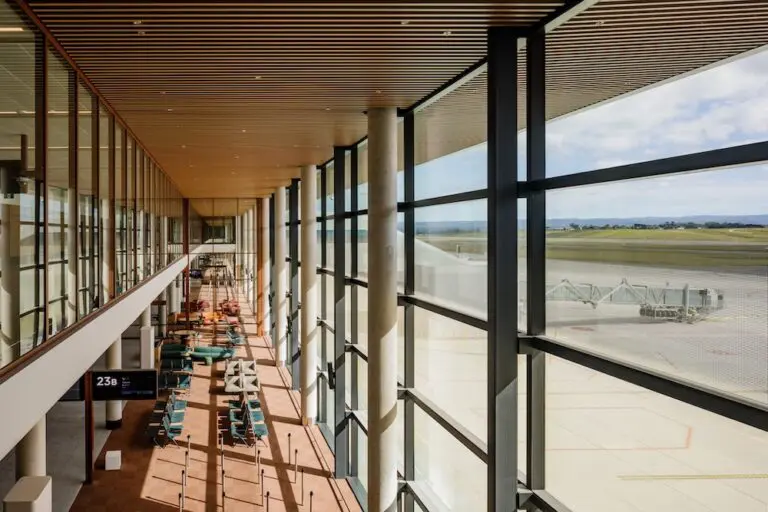With travel conditions constantly changing in the Middle East, we’ll keep you updated with the latest developments impacting Australians travelling to, from and through the Middle East – including airline responses and government advisories. Check back here for live updates as the situation unfolds.
Impact on touring
27 June 2025
With most of the attention on air travel in the Middle East, we checked in with some of the biggest names in touring to see how this sector was faring during the regional tensions.
Bunnik Tours Joint-CEO Dennis Bunnik tells Karryon the impact on business had been minimal.
“We’re not seeing much impact on touring to the Middle East,” he says.
“We had a small number of passengers cancel independent arrangements in Jordan last week due to the airspace closures.
“Other than that, it is currently mid-summer in Egypt and Jordan so generally way too hot for most people. The next high season starts in September/October and we’ve not seen any cancellations.
“A very small number have deferred their travel to early next year instead.”
Overall, Bunnik says booking numbers for Egypt have “remained really strong over the past 10 days with travel from October this year and into 2026”.
“Whilst there is obviously some nervousness, passengers who have already booked are still really keen to go. They understand that neither the airline nor the tour operator will operate if it is unsafe to do so.”

Bunnik also points to the robustness of Egypt and Jordan as destinations.
“They are so iconic and so high on everyone’s bucket list that the desire to visit them hasn’t diminished,” he says.
“Australian travellers have become far more savvy and educated around crisis and travel safety. As such there is a greater understanding of the separation of Egypt as a tourist destination from what is happening between Israel and Iran.
Brett Mitchell, Managing Director ANZ of Intrepid Travel, a major operator of tours to Egypt and Jordan in particular, says there has been a “softening in demand to the Middle East and some cancellations to Jordan and Egypt” but “not as much as we expected”.
“We continue to remain confident about Egypt and Jordan; they’ve been some of our top-selling destinations across all regions and remain open to travel,” he tells Karryon.
“Traditionally demand bounces back very quickly as both destinations are favourites for Aussie travellers.”
Mitchell says bookings for Egypt and Jordan have skyrocketed in recent times.
“Our Egypt bookings, year-on-year for the last six months, are up 145%, and bookings for Jordan are up 153%,” he explains.
“More importantly, behind the headlines are the real people, families, local guides and small businesses, whose livelihoods depend on tourism.
“It’s a tough time for those communities, and our thoughts are with them daily. At Intrepid, we’ve always believed that travel has the power to bring people together as well as build understanding and trust between different cultures.”

Not all companies are reporting minimal disruptions, however.
Sean Martin, APAC Managing Director of small group touring specialist G Adventures, says the business has “absolutely seen a drop in Middle East bookings”.
But they’re still travelling with the company, just to alternative destinations.
“These customers appear to be shifting to other destinations like Japan, Vietnam, South Africa and South America,” he tells Karryon.
“It’s such a shame, as the region has so much to give, in particular, countries like Jordan and Egypt that rely so much on the tourist dollar to support local communities.”
DFAT ups Oman
26 June 2025

The Department of Foreign Affairs and Trade (DFAT) has raised the travel advice level for Oman, the last Middle Eastern nation to be lifted from the government’s lowest alert level of ‘Exercise normal safety precautions’.
Prior to the onset of recent hostilities, Qatar and Oman, located on the southeastern coast of the Arabian Peninsula, had been the only Middle Eastern nations where Australians were advised to exercise normal safety precautions.
Qatar’s overall travel advice level was recently raised to “Exercise a high degree of caution” (“due to the ongoing hostilities in the region”), leaving Oman as the “safest” country in the Middle East.
But the flare-up in Iran, and then the attempted missile attack on US military bases in Qatar, has prompted the federal government to up its advice for the Gulf nation.
“Due to the deteriorating security situation and hostilities in the region, we’ve raised our level of advice for Oman to ‘Exercise a high degree of caution’,” DFAT says on its Smartraveller website.
The move follows a recent blanket warning for the Middle East region, which warned travellers of the volatile nature of the current situation.
Read the full story on Oman here.
Pax on new flights within 24 hours, says QR CEO
26 June 2025

Mohammed Al-Meer, CEO of Qatar Airways, has penned an open letter to passengers outlining how the carrier handled the unprecedented impact of an Iranian attack on a US military base in Qatar.
“This week brought an operational crisis few airlines will ever encounter, and one that challenged the very core of what it means to run a global airline,” opens the letter.
For the first time, Qatar Airways faced the sudden closure of Qatari and surrounding airspace (on 23 June), which caused a temporary suspension of the airline’s global operations and diverted over 90 flights carrying 20,000 passengers.
“All departures from Doha were suspended until 00:01 on 24 June at the earliest,” the CEO noted.
Flights were diverted to multiple countries, including Saudi Arabia, Turkey, India, Oman and the UAE, while operations at Hamad International Airport came to a standstill, affecting over 10,000 transit passengers.
Most significantly, Al-Meer flagged that the carrier had impacted passengers on alternative flights “within 24 hours” once airspace reopened.
“All passengers from diverted flights – approximately 20,000 in total – were cleared within 24 hours. More than 11,000 resumed their journeys during the morning wave on 24 June, with the remainder departing through the evening wave and morning bank on 25 June,” he stated.
“As of today, there are no passengers from diverted flights left stranded.”
According to the QR boss, the airline resumed operations within 18 hours, operating 390 flights on 24 June and 578 on 25 June.
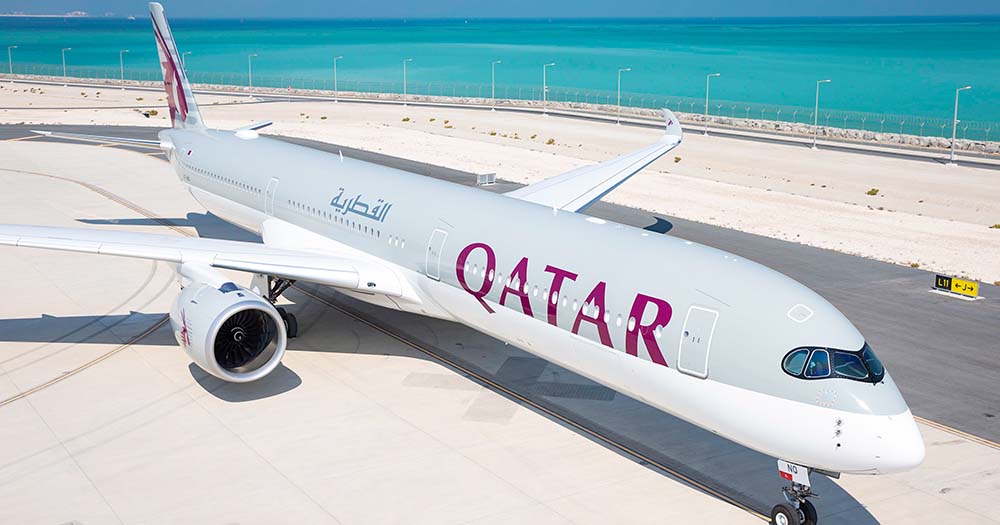
Qatar Airways also provided accommodation for more than 4,600 customers and distributed 35,000 meals.
In addition, the airline introduced a “flexible travel policy, allowing passengers who had not yet started their journeys to make changes or refund their bookings without fees”.
In the letter, Al-Meer praised staff efforts and thanked passengers for their patience.
“The professionalism and unity on display reflect the very best of what our airline group and our partners stand for.”
“Millions place their trust in Qatar Airways… That trust is not taken lightly. It is earned, through action, through responsibility, and a readiness to act when it matters most.”
What agents are seeing
26 June 2025
We asked travel advisors what impact, if any, the current situation in the Middle East was having on business. Unsurprisingly, there have been a lot of questions – mostly around air travel – but fortunately, few cancellations so far.
“My clients are on edge, with immediate travel with any airlines that are flying in the Middle East – for instance, Qatar, Emirates and Etihad,” Personal Travel Manager (PTM) Tanya Patterson told Karryon.
“I can only advise them to keep updated on the Smarttraveller website.”
What makes matters worse, says Patterson, is the situation with travel insurance.
“It’s awful when flying around colleagues and agents on different Facebook pages, and platforms are saying ‘insurance companies do not pay out for war’,” she said.
“It’s scary times at the moment, that’s for sure.”
But Patterson is heartened to see the travel agency community binding together.
“It’s great to be a part of many different platforms for agent updates too. We’re all in this together and assist each other, no matter what travel company you work for.”

Echoing Patterson, private travel manager at luxebyitravel, Geoff Currie, told Karryon he had received a few enquiries about air travel through the Middle East.
“It’s been more about where the airlines are flying via,” he explained.
“I think the media has warned that the conflict zone airspace has been closed, so Australians feel more comfortable knowing aircraft are not flying over that area.
“I see most Emirates and Qatar flights are being rerouted and an hour or so longer. So far, no one is panicking or cancelling.”
Flight Centre Indooroopilly Team Leader Sam Hele said his team had seen similar concerns about flights, but nothing too impactful on overall business.
“We’re having a lot of customers look into changing their carrier over to Europe,” he told Karryon.
“They’re preferring to fly through Asia over the Middle East, where possible. Other than that, we haven’t really had customers start to cancel any of their trips yet.”
Insurance coverage
26 June 2025
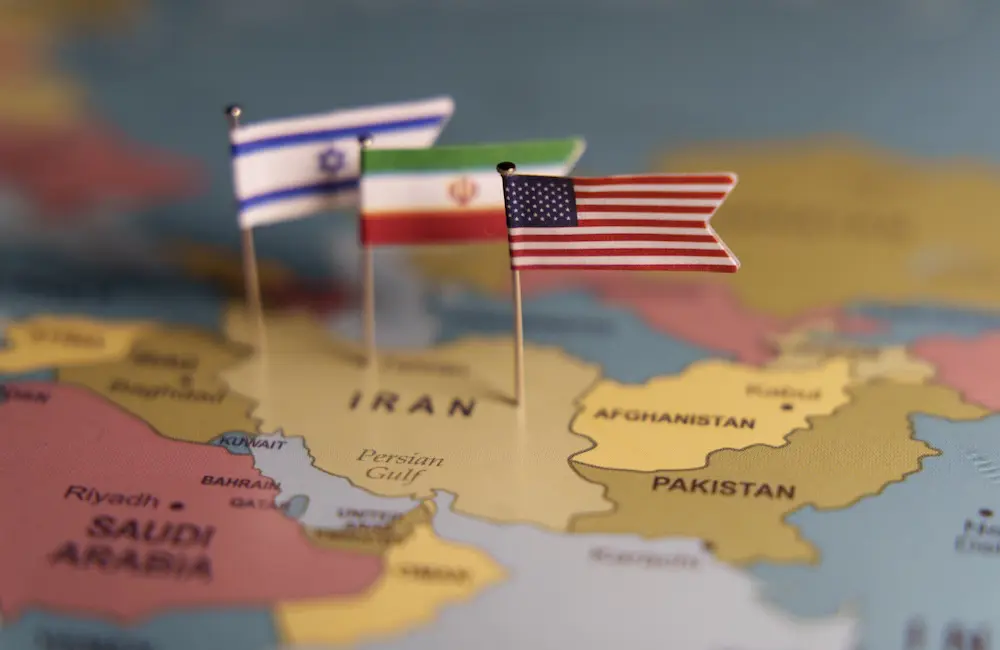
Managing Director of Comparetravelinsurance.com.au, Natalie Ball, says that despite general exclusions that may apply to the current situation, travellers could still be entitled to compensation.
“Impacted travellers should first seek compensation through their travel providers. If they are not eligible for compensation, their next step should be to contact their travel insurer, confirming exactly what’s covered under their policy, especially where government advisories and known events are concerned.”
Travelling against government advice is key, says Ball, as this could put one’s coverage at risk.
“Travelling to a destination with a ‘Do Not Travel’ warning could invalidate your travel insurance policy,” she explains.
“This includes cancellations, disruptions, or medical emergencies related to the conflict. If you’re planning to travel to a high-risk country, you should take steps to understand the potential exclusions that apply to your cover.
“As well, those who travel against such warnings may face limited or no consular assistance during emergencies, so consider these factors carefully making any travel decisions.”
Truce or no truce?
25 June 2025 [updated 10.30am]

An unhappy US President Donald Trump, who told reporters in Washington that Israel and Iran “don’t know what the f— they’re doing”, said both both countries had continued fighting after a ceasefire was set to begin on Tuesday afternoon (AEST).
Initially, Iran insisted it had upheld the truce, while a restrained response by Israel hinted the agreement was still largely holding, the New York Times reported. According to Associated Press, the truce appeared to hold Tuesday after initially faltering.
In any case, the ceasefire deal – the terms of which remain unknown – still appears shaky, which means more uncertainty for travel.
“Minimal disruptions”
25 June 2025
Emirates says it resumed normal operations within hours of the regional events overnight Monday, reporting only “minimal disruptions”.
According to the airline, a “small number” of services were cancelled, while some flights saw longer routes due to airspace restrictions.
The Dubai-based carrier says its contingency measures have limited impact on travellers while maintaining safety, with operations across unaffected routes remaining stable throughout the period of increased tension.
Qantas flights diverted
24 June 2025
In an update just before midday, Qantas said that two of its Europe-bound flights had been diverted today.
“Due to additional airspace closures and congestion through the Middle East, our Perth-London (QF9) service has been diverted to Singapore and Perth-Paris (QF33) is returning to Perth,” it stated.
According to Flightaware, the Paris-bound flight flew for 15 straight hours before touching back down in Perth.
“We continue to monitor airspace availability closely and will alter our schedule as required,” it added.
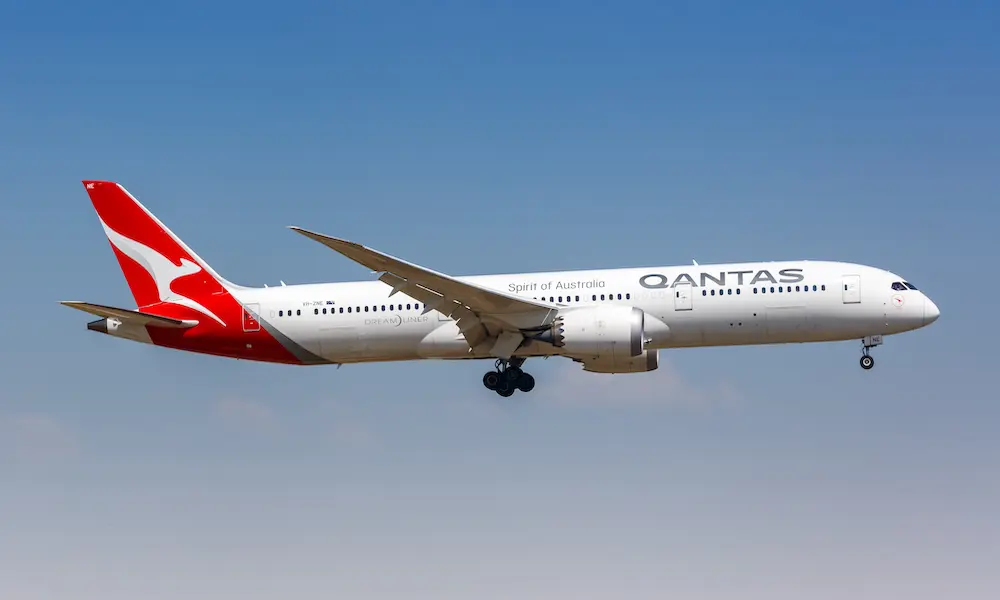
Other services between Australia and Europe scheduled to depart on today (24 June 2025) are “operating as planned”, including:
- QF1 Sydney to London via Singapore
- QF2 London to Sydney via Singapore
- QF5 Perth to Rome
- QF6 Rome to Perth
“There are no scheduled flights to Paris on Tuesday 24 June,” it added.
The carrier stated that there is currently “no need to make any changes” to bookings.
Trump announces truce; Israel-Iran govts silent
24 June 2025
US President Donald Trump announced on social media at around 8am (AEST) that Israel and Iran had agreed to a “complete and total ceasefire (in approximately 6 hours from now…) for 12 hours, at which point the War will be considered ended!”.
The proclamation came just hours after Iran fired missiles at US military bases in Qatar, which forced Doha International Airport to temporarily suspend operations and Qatar Airways to briefly ground all flights.
However, according to The Washington Post, neither the Israeli nor Iranian governments have confirmed the ceasefire, which Trump’s said would come into effect at around 2pm (AEST).
Qatar resumes flights
24 June 2025
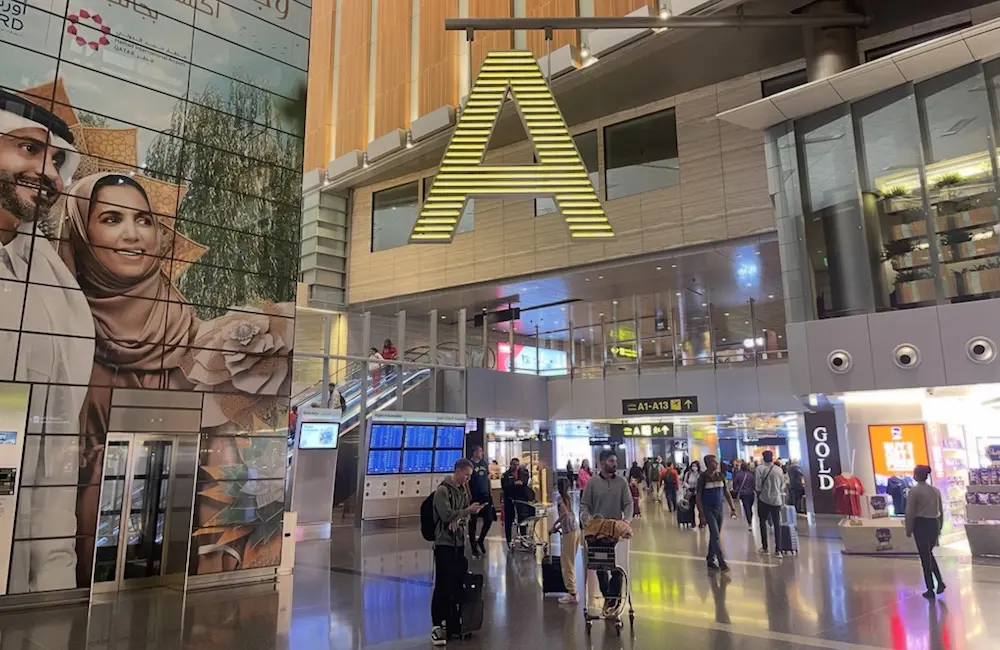
Qatar Airways has reinstated flights after Qatar closed its airspace following an Iranian missile attack on US military bases in the country.
The airline had paused all operations into and out of Doha’s Hamad International Airport late on Monday (local time) before announcing the resumption of services around two hours later.
“Our focus at this time is to help our passengers return home or reach their onward journey safely and smoothly,” the carrier stated.
“We are working tirelessly with government stakeholders and the relevant authorities to restore operations as quickly as possible.
“We have also deployed additional ground staff at Hamad International Airport and other key airports to assist affected passengers by minimising disruptions and offering the utmost care and support to all customers.
“As operations resume, we anticipate significant delays to our flight schedule.
“The safety of our passengers and crew is the first and highest priority at all times.”
EK flying after DXB closure
24 June 2025

Airspace closures in the region also impacted Dubai flights, but Dubai International Airport states that “operations resumed after a brief suspension”.
“Due to recent airspace closures affecting parts of the region, flights operating out of Dubai International (DXB) and Dubai World Central – Al Maktoum International (DWC) may experience delays, cancellations, or diversions,” Dubai Airports said.
“We strongly advise all travellers to check with their airline for the latest flight status before heading to the airport, and to allow extra time for their journey.”
In a statement on X, Emirates said that, “Due to the recent regional situation, a number of Emirates flights were rerouted enroute to Dubai on 23 June, but there were no diversions.”.
“After a thorough and careful risk assessment, Emirates will continue to operate flights as scheduled, using flight paths well distanced from conflict areas.
“Some flights may incur delays due to longer re-routings or airspace congestion, but Emirates’ teams are working hard to keep to schedule and minimise any disruption or inconvenience to our customers.”
Abu Dhabi’s Zayed International Airport also advised passengers to check with their airlines before heading to the airport “in light of current events and flight disruptions” overnight. “The safety of our travellers is our foremost priority,” it added on X at 7am this morning (AEST).
Meanwhile, Gulf Air has announced the resumption of its flights after the temporary closure of Bahraini airspace.
“We regret any inconvenience caused and thank our customers for their patience and understanding,” it states on its website.
The airline’s Jordan and Iraq flights remain grounded until at least 27 June.
“As the safety of its passengers and crew members remains a top priority, Gulf Air will continue to monitor developments in the region closely, and work with its partners to help accommodate and reroute passengers affected by these flight cancellations,” it states.
What’s DFAT saying?
23 June 2025

After updating its travel advice for Israel and the Occupied Palestinian Territories on Sunday, the Department of Foreign Affairs and Trade (DFAT) issued new travel alerts for every country in the Middle East on Monday (23 June).
While the overall advice level hasn’t changed for any country since last week, DFAT has warned Australian travellers of potential disruptions, even for countries not directly impacted by the latest hostilities.
“Conflicts in the Middle East could result in an increase in tensions elsewhere in the region and may result in airspace closures, flight cancellations and other travel disruptions,” it states.
“The security situation in the Middle East is unpredictable and could deteriorate further with little warning. There is a risk of reprisal attacks and further escalation across the region, as well as the potential for terrorist attacks.”
It also warned that the conflict could be felt around the world, with travel disruptions possible “globally”.
“Conflict in the Middle East could impact safety and security elsewhere,” it says.
“Protests and civil unrest may happen globally. The risk of terrorist attacks can increase, particularly around areas where foreign tourists gather, embassies and other foreign interests.
“Your travel plans may be affected, even if your destination is not in the Middle East.”

It also warned of the difficulties travellers could face when trying to leave if the conflict escalates.
According to DFAT, Australians can leave Iran via border crossings into Azerbaijan, Türkiye, Armenia and Turkmenistan.
However, it continues to advise “Do Not Travel to Afghanistan, Iraq or the regions of Pakistan that border Iran”.
Aussies can exit Israel using crossings into Jordan and Egypt.
In addition, it urges Australians in Israel, the Occupied Palestinian Territories and Iran to register with the department at crisis.dfat.gov.au for direct updates.
It also has the following general advice for travellers:
- Contact your airline to confirm your flights.
- Check your travel insurance’s policy on flight cancellations and travel advice level increases.
- Research where you’re going before you book. Read the travel advice for your destination and subscribe for free updates.
- Check the advice level and understand what our advice levels mean.
- Decide if you feel safe travelling to your planned destination.
- Be aware of current affairs where you’re going.
- Be alert to possible threats, especially in public places or mass gatherings.
- Report anything suspicious to the police.
- Monitor the local and international news for any new threats.
- Take official warnings seriously.
- Decide if you feel safe travelling to your planned destination.
- Follow the instructions of local authorities.
Don’t panic, says ATIA
23 June 2024

The Australian Travel Industry Association (ATIA) is urging Australians to stay calm amid the unfolding Middle East conflict and avoid contacting travel agents or airlines unless travelling within the next three days. It says that unnecessary cancellations may reduce refund or rebooking entitlements.
In addition, the association warns Aussie travellers to expect delays and to follow official travel advice.
“Australians flying to Europe via the Middle East should be prepared for some delays, but it’s important to know that global airlines have systems in place to manage these disruptions,” ATIA CEO Dean Long says.
“The closure of airspace is not new. Airlines have been rerouting around Russia and Ukraine for more than two years, and are now adjusting again. The airlines that fly to Australia have world-leading safety protocols and route management.
“Travellers shouldn’t panic or cancel unnecessarily. The one thing we learned through COVID is don’t cancel, as it reduces the number of rights you have. Let the airline make that decision. This approach ensures your rights are protected and you get the support you need.”
“In volatile situations like this, having an ATIA Accredited Travel Business on your side makes all the difference. They have direct access to airline systems, understand the complexities of changing travel conditions, and will advocate on your behalf to rebook disrupted flights or secure refunds. It means you’re not navigating delays, diversions or cancellations alone.”
Aussies ask for aid
23 June 2025
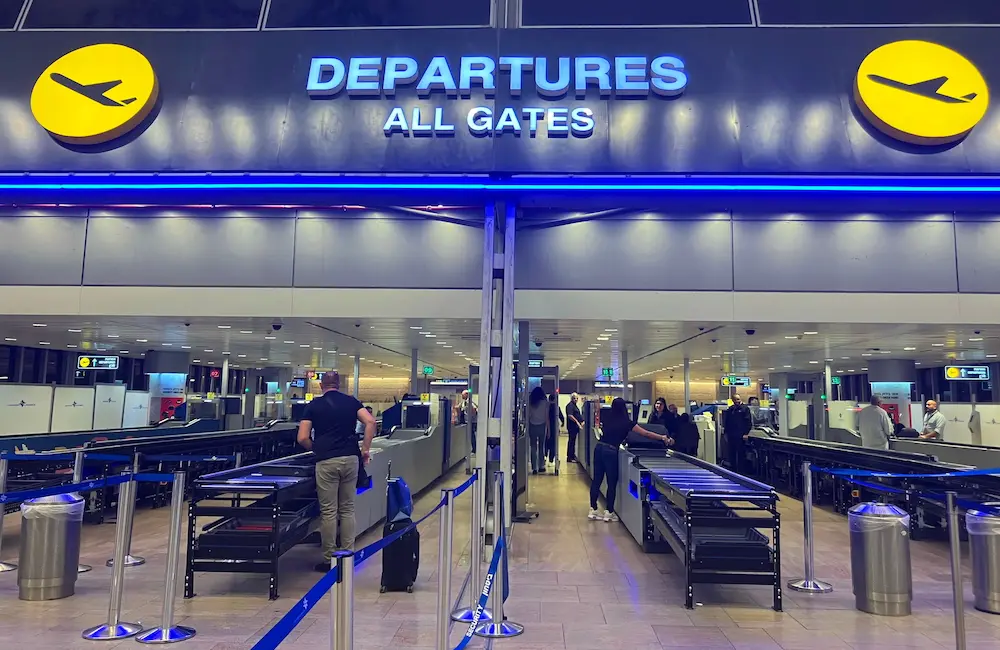
In an update Monday morning, Minister for Foreign Affairs Penny Wong said that around 4,200 Australians have formally asked the federal government for assistance to leave Iran and Israel, with about 2,900 people in Iran and some 1,300 people in Israel.
Wong added that the “serious” and “fluid” situation makes it hard to evacuate Australians, the ABC reports. The minister also said that a flight from Israel is planned if airspace opens.
According to Reuters, Israeli national airline El Al said on Sunday that around 25,000 people had applied to leave Israel in a day.
Approximately, 40,000 tourists in the country looking to flee, with many leaving via Jordan, Egypt and Cyprus.
El Al planned to resume flights from Tel Aviv on Monday as part of limited “rescue” flights.
Air travel update
23 June 2025
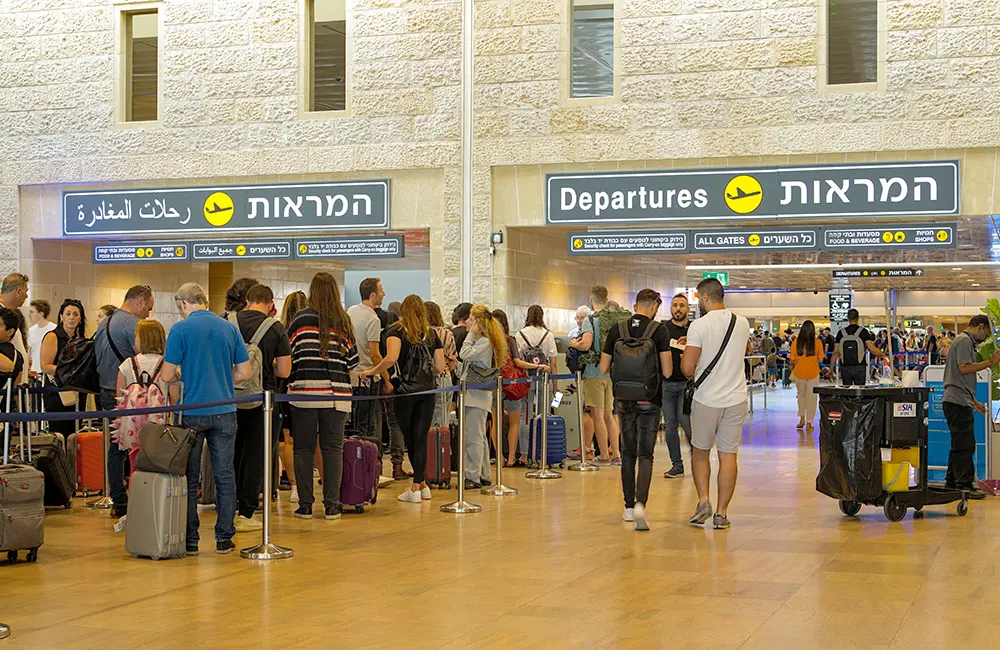
With airspace and airports impacted by the Middle East conflict, carriers continue to cancel, reschedule and reroute flights in the region.
Qatar Airways, one of the biggest carriers between Australia and the Middle East (and onwards), said the latest developments would “require some schedule changes to strengthen the connectivity in Doha”.
“We have deep experience and operational know-how when it comes to situations like this, demonstrated clearly when we remained one of the few global airlines flying throughout the COVID-19 crisis,” it said in a statement.
“We are continuously monitoring and assessing the situation, and reacting in real-time to ensure we operate under the safest conditions possible at all times.
UAE-based carrier, Etihad stated that it had suspended all flights between Abu Dhabi and Tel Aviv until and including 15 July.
“Guests transiting through Abu Dhabi to connect to cancelled flights will not be accepted for travel from their point of origin. Impacted guests are being assisted with alternative travel arrangements,” it said in a statement.
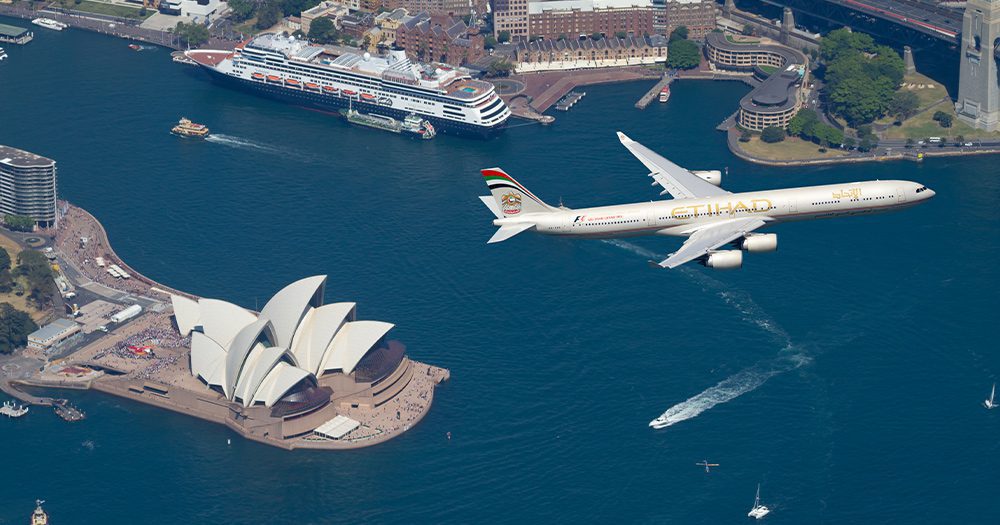
“This remains a highly dynamic situation, and further changes or disruption, including sudden airspace closures or operational impact, may occur at short notice. Etihad continues to monitor developments closely in coordination with the relevant authorities and is taking all necessary precautions.
“The safety of our guests and crew remains our highest priority, and we regret any inconvenience caused.”
Karryon has reached out to Emirates, another major airline connecting Australia with the world through its Dubai hub, for comment.
Meanwhile, Qantas said “there are no material changes to Qantas flights to between Australia and Europe”.
“We continue to monitor the situation closely. We have a number of flight path options that we utilise for our flights to Europe and these are reviewed regularly based on factors including weather and security,” it added.
“We proactively alter our flight paths if needed based on changes in these conditions.”

Elsewhere, many global airlines are now avoiding airports beyond the Levant region of the Middle East, with major ports in the Persian Gulf region also now seeing significant impacts.
British Airways, Singapore Airlines and Air France said on Sunday they had cancelled flights to Dubai, Doha and Riyadh, Arab News reported.
In the lead-up to the US strikes on Iran, American Airlines suspended flights to Qatar, and United halted services to Dubai.
According to Reuters, website Safe Airspace stated that the US attacks could increase risks to American airlines in the region.
“While there have been no specific threats made against civil aviation, Iran has previously warned it would retaliate by attacking U.S. military interests in the Middle East – either directly or via proxies such as Hezbollah,” Safe Airspace said.
Turkish changes
21 June 2025

Turkish Airlines has issued a travel update in response to the ongoing situation in Iran, Iraq, Syria, Jordan and Lebanon.
The airline is offering added flexibility for affected passengers with tickets issued on or before 13 June 2025 for travel between 13 June and 31 July 2025.
Travellers can rebook or extend their travel dates until 31 August 2025, with all changes or refund requests needing to be processed by 31 July 2025.
For interline tickets where Turkish Airlines is the marketing carrier, standard fare rules apply for rebooking and rerouting.
Full refunds are available for unused tickets if processed by 31 July, while partially used tickets will be refunded for the unused portion under involuntary refund terms.
Turkey’s national carrier flies from Melbourne and Sydney to Istanbul via Kuala Lumpur.
DFAT raises travel alert level for popular stopover for Australians
19 June 2025

The Australian Government has raised its travel alert level for a popular stopover destination as the ripple effects of two bloody conflicts in the Middle East continue to be felt.
In response to a rise in the intensity of hostilities between Israel and Iran and Hamas (Gaza), the Department of Foreign Affairs and Trade (DFAT) has upped its travel advice for Gulf nation Qatar to “Exercise a high degree of caution due to ongoing hostilities in the region”.
Previously, the government advised Aussies to “Exercise normal safety precautions” in Qatar.
“We advise exercise a high degree of caution due to ongoing hostilities in the region,” DFAT states on the Smartraveller website in its latest travel alert for Qatar.
“Conflicts in the Middle East could result in an increase in tensions elsewhere in the region and may result in airspace closures, flight cancellations and other travel disruptions.”
“There’s an ongoing threat of attacks against Israeli interests across the region.”
Read this full story here.
DFAT updates Middle East travel advice as Israel-Iran conflict wages on; airlines cancel, reroute flights
16 June 2025
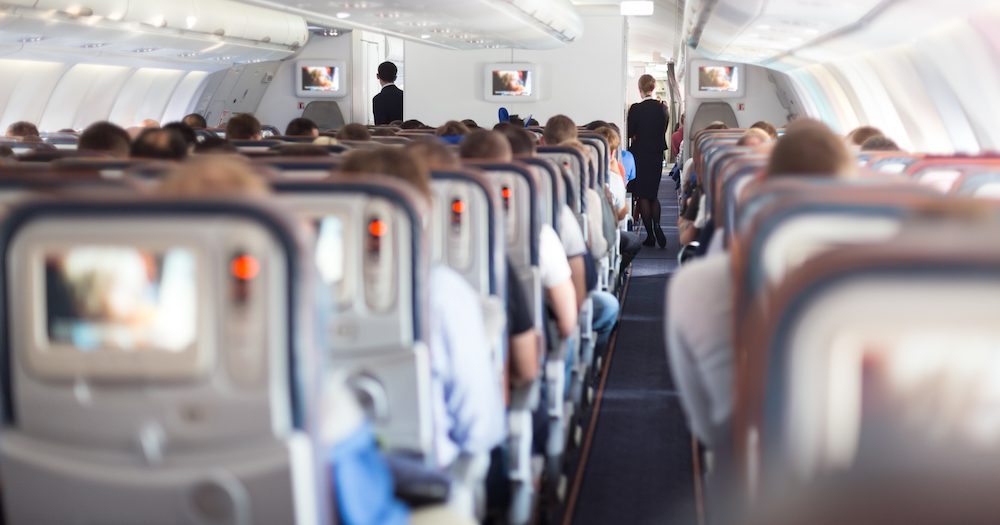
As Iran and Israel continue to fire missiles at each other, the Australian Government has upgraded its travel advice for Aussies considering heading to the region.
Previously, the Department of Foreign Affairs and Trade (DFAT) had warned Australians against any travel to parts of Israel and the Occupied Palestinian Territories – including Gaza and neighbouring areas, regions bordering with Lebanon and the West Bank.
However, with the latest attacks, DFAT has widened its highest travel advice level (‘Do not travel’) to the entire country, making the whole region – including Lebanon, Syria, Iraq and Iran – a no-go zone.
“Due to the deteriorating security situation, we advise, do not travel to Israel and the Occupied Palestinian Territories due to the volatile security situation, armed conflict, civil unrest and terrorism,” it states on its Smartraveller website.
“Following military strikes in Iran, there are military and rocket attacks against Israel. Israel has declared a national state of emergency.”
“In an attack or other armed conflict, you should take shelter, follow the advice of local authorities and monitor local media and public safety information updates through the National Emergency Portal.”
On top of missile strikes, the department warns that “terror attacks can occur anywhere at any time, including by lone actors”.
The department also issued updated travel advice for the entire Middle East and Gulf region on Friday.
Read this full story here.
Air travel update
16 June 2025
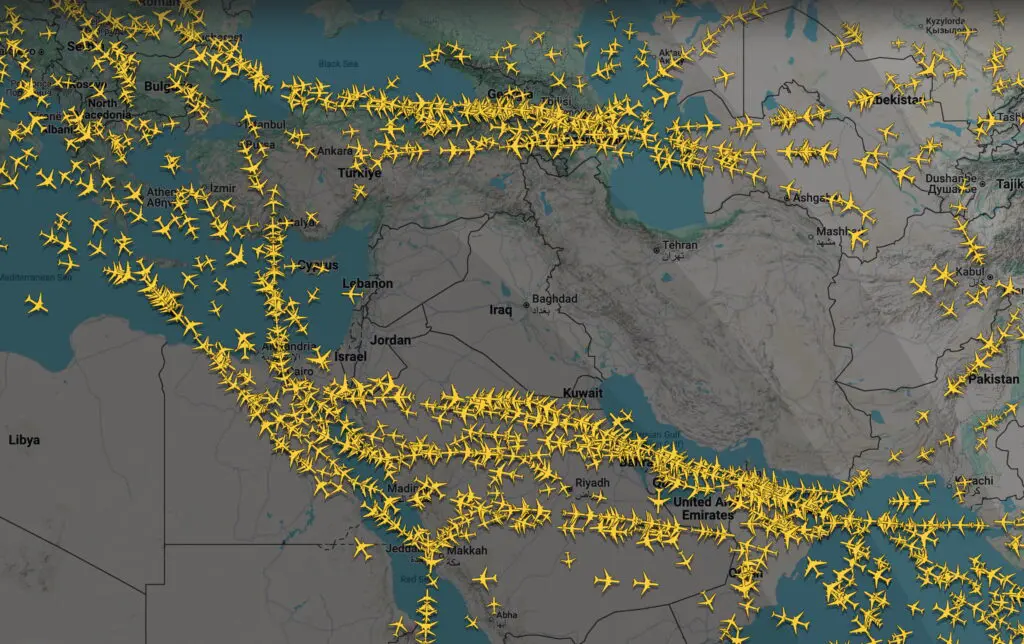
Airlines continue to suspend, cancel or reroute flights in the region as airports and airspace close. Israel’s main hub, Ben Gurion Airport, states that all flights to and from the gateway are “cancelled until further notice” due to the “current special security situation”.
DFAT says that, “flight cancellations and disruptions could continue with little or no notice, including due to airport and airspace closures”.
“Check with your airline for the latest updates before travelling. If you’re in Israel, you should depart when it’s safe to do so,” it states.
According to state media, Iranian and Iraqi airspace have been closed until further notice, including a busy air corridor linking Europe with the Gulf and Asia. Meanwhile, Jordan has also “temporarily” closed its airspace to all flights, Al Jazeera reported.
Read this full story here.
If you’d like to get in touch with us with any updates or comments about this story, contact editor@karryon.com.au. To get updates straight to your inbox, subscribe to Karryon.






